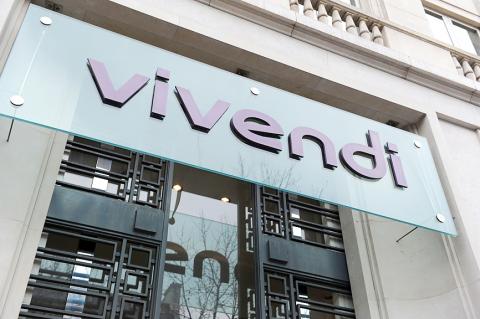Vivendi SA will acquire Mediaset SpA’s pay TV arm and take a stake in the Italian broadcaster as part of French tycoon Vincent Bollore’s plan to build a European media giant to rival US streaming powerhouse Netflix Inc.
The partnership will see the companies swap 3.5 percent stakes in a “strategic alliance” aimed at “capturing new opportunities across the international competitive landscape,” Mediaset said in a statement on Friday.
France’s Vivendi will take complete ownership of Mediaset Premium, the Italian company’s loss-making pay TV arm, acquiring Mediaset’s 89 percent stake and the 11 percent held by Spain’s Telefonica SA.

Photo: AFP
Mediaset Premium, which has the right to broadcast Champions League soccer matches until 2018, had 2.01 million subscribers in late December, against 1.7 million six months earlier.
By comparison, competitor Sky Italia has 4.7 million.
Vivendi, which already owns leading French pay TV channel Canal+ and Universal Music Group, said in a statement that the move “greatly expands its presence in European pay-television” and increases its global individual subscriber base to more than 13 million.
“The agreement with Mediaset confirms Vivendi’s intention to build strong positions in southern Europe, a market that shares a similar Latin culture and roots,” it said.
Mediaset said that the project with Vivendi would allow the emergence of a new major content player.
The company said the aim was to create “the first pan-European on-demand streaming content platform,” bringing together the online properties of the two groups in Italy, France, Spain and Germany to offer a wide ranger of films and TV series.
“The aim of the new platform will also be to distribute dedicated original productions. The new project also forecasts expansion in countries where the two companies are not currently present,” Mediaset said.
Vivendi is also the main shareholder of Italy’s Telecom Italia, with a 24.9 percent stake.
Citing the agreement with Mediaset, Vivendi CEO Arnaud de Puyfontaine on Friday said that “this investment demonstrated once again our commitment and our close ties with Italy: the confirmation of our strategy to create a pan-European leader in media and content production.”
By snapping up Mediaset Premium, Vivendi is expanding a global pay TV network already established in France, Poland, Africa, Central America and the Far East, the company said.
According to Italian press reports, the French group also has it sights on Italian production company Cattleya, which has turned out the hit crime thriller television series Romanzo Criminale and Gomorrah.
Would-be media giants are faced with a rapidly evolving scene with global video contents on the up, the emergence of international OTT players (“over-the-top content,” the delivery of media directly over the Internet) and the increasingly transnational structure of pay TV players.
News of the deal followed Vivendi’s announcement this week that it is launching Studio Plus, a production label dedicated to international series in multiple languages for mobile screens, from smartphones to tablets.

A proposed 100 percent tariff on chip imports announced by US President Donald Trump could shift more of Taiwan’s semiconductor production overseas, a Taiwan Institute of Economic Research (TIER) researcher said yesterday. Trump’s tariff policy will accelerate the global semiconductor industry’s pace to establish roots in the US, leading to higher supply chain costs and ultimately raising prices of consumer electronics and creating uncertainty for future market demand, Arisa Liu (劉佩真) at the institute’s Taiwan Industry Economics Database said in a telephone interview. Trump’s move signals his intention to "restore the glory of the US semiconductor industry," Liu noted, saying that

On Ireland’s blustery western seaboard, researchers are gleefully flying giant kites — not for fun, but in the hope of generating renewable electricity and sparking a “revolution” in wind energy. “We use a kite to capture the wind and a generator at the bottom of it that captures the power,” said Padraic Doherty of Kitepower, the Dutch firm behind the venture. At its test site in operation since September 2023 near the small town of Bangor Erris, the team transports the vast 60-square-meter kite from a hangar across the lunar-like bogland to a generator. The kite is then attached by a

Foxconn Technology Co (鴻準精密), a metal casing supplier owned by Hon Hai Precision Industry Co (鴻海精密), yesterday announced plans to invest US$1 billion in the US over the next decade as part of its business transformation strategy. The Apple Inc supplier said in a statement that its board approved the investment on Thursday, as part of a transformation strategy focused on precision mold development, smart manufacturing, robotics and advanced automation. The strategy would have a strong emphasis on artificial intelligence (AI), the company added. The company said it aims to build a flexible, intelligent production ecosystem to boost competitiveness and sustainability. Foxconn

Leading Taiwanese bicycle brands Giant Manufacturing Co (巨大機械) and Merida Industry Co (美利達工業) on Sunday said that they have adopted measures to mitigate the impact of the tariff policies of US President Donald Trump’s administration. The US announced at the beginning of this month that it would impose a 20 percent tariff on imported goods made in Taiwan, effective on Thursday last week. The tariff would be added to other pre-existing most-favored-nation duties and industry-specific trade remedy levy, which would bring the overall tariff on Taiwan-made bicycles to between 25.5 percent and 31 percent. However, Giant did not seem too perturbed by the